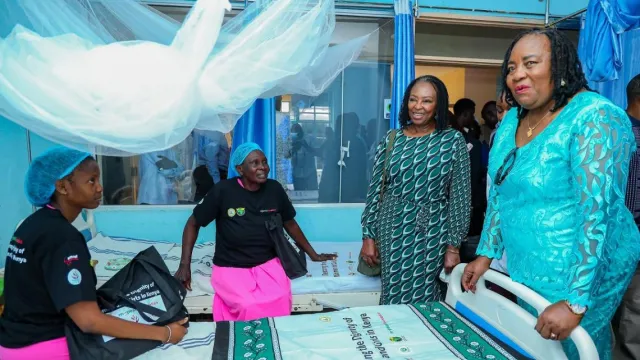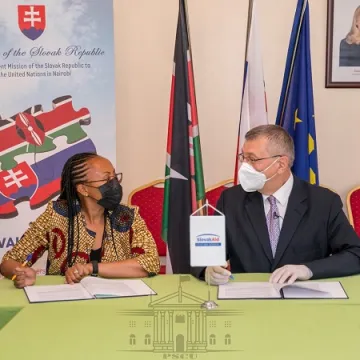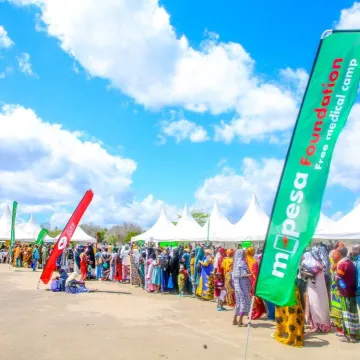Two weeks of life-changing fistula care underway in Migori

Mama Ida Odinga (right) and M-Pesa Foundation Trustee, Patricia Ithau (second right) engaging with recovering fistula patients during the launch of phase two of the Integrated Fistula Programme at the Migori Teaching and Referral Hospital.
An integrated fistula surgery and medical camp at the Migori County Referral Hospital targeting women and girls has entered the second phase as the M-PESA Foundation enhances social impact in the area.
In partnership with the Flying Doctors Society of Kenya, AMREF and the county government, the two-week exercise seeks to add at least 200 more women to the previous 700 women treated in the initial phase of camps held across Kisii, Bungoma, Nyeri, Tharaka Nithi, Kajiado, Kilifi, Garissa, Makueni, Homa Bay, Kiambu and Nairobi counties.
“Let us encourage as many women as possible from our and the neighbouring counties to seek treatment and related integration support, to enable them to live a life free of pain and out of isolation," said Nicholas Ng’ang’a, Chairman, M-PESA Foundation.
Fistula occurs when a hole forms between the birth canal and the bladder or rectum, usually due to prolonged or difficult labour without access to quick, skilled care. Quite often, the affected experience constant leaking, infections, shame, and isolation.
The health complication is, however, treatable with surgery and follow‐up support. Kenya records approximately 3,000 new cases each year, yet less than half get access to the necessary surgical corrective procedure. On average, a corrective surgery costs between KES51,700 and KES129,200 per case.
To prevent the occurrence of new cases, health experts advise that people would seek better labour monitoring at healthcare centres where they can access caesarean sections procedures and good bladder care in
maternity units.
According to the World Health Organization (WHO), between 50,000 and 100,000 women worldwide are affected by obstetric fistula annually, a condition caused by prolonged labour and prevalent in early pregnancies, resulting in incontinence, social segregation and related health problems.
“This is more than a medical intervention. It is a journey of restoration: of health, hope, and humanity. Together, we are building a system that will enable every woman to heal and reclaim her dignity,” Dr. Meshack Ndirangu, Country Director, Amref Health Africa in Kenya.
Data from the Ministry of Health shows that only 10 fistula repair health facilities exist countrywide, attending to an estimated 3,000 cases annually.
Compounded by the lack of dedicated theatre facilities and speciality care, most patients go without treatment or comprehensive care, limiting this to free medical outreaches, creating a backlog of patients in need of corrective surgery.
“Obstetric fistula robs women of their dignity and place in society. This partnership is allowing us to restore hope and transform lives, one surgery at a time,” Ms Tanya Nduati, CEO, FDSA.
The camp is in celebration of M-PESA Foundation’s 15 years of impact, adding to the growing number of women and girls who have benefited from corrective fistula treatment, surgery and comprehensive medical care.
The initiative is part of wider efforts under the health pillar, where the Foundation seeks to improve Access to quality Reproductive, Maternal, Neonatal, Adolescent, and Child Health (RMNCAH), boosting referrals, access, and improving health infrastructure.





